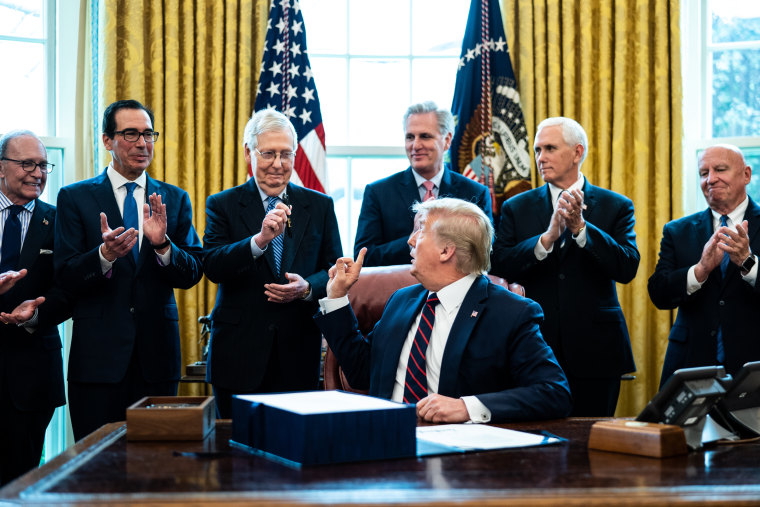As part of his needlessly divisive remarks on the Fourth of July, President Donald Trump briefly took note of the nation's struggle with the coronavirus crisis. "Our strategy," the president assured his audience, "is moving along well."
Even by Trump standards, it was a curious boast. Now with 3 million confirmed cases in the United States, and over 130,000 American deaths from COVID-19, few would look at the public health landscape and conclude that the federal response is progressing "well."
The president believes there's a federal strategy? If there is, it's hiding exceptionally well.
But there was also a problem with the assumption upon which the boast was based: The president believes there's a federal strategy?
If there is, it's hiding exceptionally well. Months after the pandemic arrived, the Trump administration still does not have a national testing strategy. Or a federal program in place to fully furnish medical facilities with personal protective equipment. Or meaningful guidance to offer state and local officials on how, when and whether to reopen safely in the wake of mitigation efforts in the spring.
The result is, to be sure, a public health crisis that appears to be intensifying with each passing day. But just as important, Americans should also recognize these conditions as part of a governing crisis.
The Republican Party has abandoned its traditional role as a governing party and become what I call a post-policy party — one that no longer cares about the substance of policymaking. The White House's response to the pandemic offers a case study that bolsters the point to a painful degree.
This was not always the case. While partisan disputes have been common for generations, Americans used to be able to have some confidence that both major parties were responsible governing entities, their ideological differences notwithstanding.
But after President Barack Obama's election in 2008, as the George W. Bush/Dick Cheney era came to an ignominious end, the modern GOP found itself at a crossroads. It made the unfortunate decision to stop engaging in serious policymaking altogether — helping pave the way for the post-policy presidency Americans are witnessing today.
At its most basic level, governing involves using levers of power to achieve specific policy goals, but real governing — responsible and effective governing — involves taking seriously things such as evidence and data. It requires those in positions of power to value expertise. It means prioritizing policy over politics. It demands those with authority do their due diligence and shape plans that work.
But when it comes to the coronavirus crisis, the administration has chosen to go in a far less constructive direction. Those looking for the president's pandemic plan or blueprint for success will be looking for a very long time.
What Americans see instead is Trump, ignoring those who know what they're talking about, clinging to the idea that the pandemic will "sort of just disappear" at some point, as he put it in a July 1 interview with the Fox Business Network. In lieu of a carefully crafted strategy, the president is content to cross his fingers and hope for the best.
A variety of words come to mind to describe such a posture, but "governing" isn't one of them.
As indefensible as the Republican's position is, it's unfortunately not limited to the pandemic. Just in recent weeks, Trump and his team have confronted an economic crisis — the direct result of the coronavirus crisis — for which the White House has no apparent strategy. Indeed, as the unemployment rate reached levels unseen since the Great Depression, the president was asked for his plan to turn things around. Trump responded that an economic recovery was right around the corner, telling reporters: "I feel it. I feel it. I think sometimes what I feel is better than what I think."
Of course, there's a difference between a president's plans and a president's feelings: One has substantive value.
Soon after, the public got its first look at former White House national security advisor John Bolton's book, which accuses Trump of, among other things, prioritizing politics over governing in every possible instance. "I am hard-pressed to identify any significant Trump decision during my White House tenure that wasn't driven by re-election calculations," Bolton wrote.
This came on the heels of widespread social justice protests following George Floyd's violent death at the hands of a Minneapolis police officer. Many looked to the White House for proposals and possible solutions, but after signing a largely symbolic executive order on policing generally, the president lost interest in the issue — and began characterizing Black Lives Matter as "a symbol of hate."
More recently, Trump was confronted with reports of Russia allegedly offering bounties to Taliban-linked militants, with Moscow reportedly offering financial rewards to those who killed American troops. Part of the official line was the suggestion that the president didn't know about the intelligence findings, because he hadn't bothered to read them in the official briefing materials.
Taken individually, each of these crises — public health, economic, national security, social inequalities — reflect an important test that Trump and his team failed. But taken together, the common thread that ties the stories together is the one that rests at the heart of my new book: The White House's failures aren't just agonizing, they're also inevitable, because the president and his party have grown wholly indifferent to the substance of solving problems. The more Trump and GOP leaders effectively abandon their roles as serious policymakers, the more breakdowns are impossible to avoid.
Ideally, with so many overlapping challenges facing the country, Americans would see their elected leaders focused on crafting, scrutinizing and implementing worthwhile solutions. But that would require that our political system have two governing parties — which, in 2020, is one more than we currently have.




